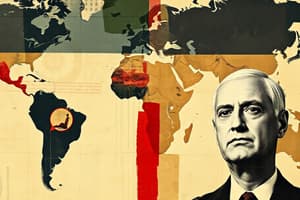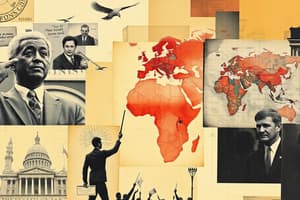Podcast
Questions and Answers
What is a key method in qualitative analysis used in international relations research?
What is a key method in qualitative analysis used in international relations research?
- Surveys
- Case studies (correct)
- Statistical modeling
- Experimental designs
Which factor has contributed to the rise of populism and nationalism in global politics?
Which factor has contributed to the rise of populism and nationalism in global politics?
- Growing tech industry influence
- Increased globalization
- Resource scarcity (correct)
- Economic sanctions
What is one of the key challenges posed by environmental issues in international relations?
What is one of the key challenges posed by environmental issues in international relations?
- Reduction of trade tariffs
- Displacement caused by climate change (correct)
- Increased consumerism
- Expansion of military alliances
What trend reflects a shift in power dynamics in global politics today?
What trend reflects a shift in power dynamics in global politics today?
Which research method heavily relies on statistical analysis to interpret international data?
Which research method heavily relies on statistical analysis to interpret international data?
What is the primary focus of realism in international relations?
What is the primary focus of realism in international relations?
Which concept refers to the authority of a state to govern itself without external interference?
Which concept refers to the authority of a state to govern itself without external interference?
In the context of international relations, what does soft power refer to?
In the context of international relations, what does soft power refer to?
Which theory of international relations emphasizes the role of international institutions in achieving peace?
Which theory of international relations emphasizes the role of international institutions in achieving peace?
What are multinational corporations primarily characterized by?
What are multinational corporations primarily characterized by?
Which major international issue is concerned with the causes and strategies of armed conflicts?
Which major international issue is concerned with the causes and strategies of armed conflicts?
What does constructivism in international relations primarily focus on?
What does constructivism in international relations primarily focus on?
Which of the following best describes globalization in the context of international relations?
Which of the following best describes globalization in the context of international relations?
Study Notes
Political Science: International Relations
Definition
- International Relations (IR): A subfield of political science that studies the interactions between countries, the roles of sovereign states, intergovernmental organizations, non-governmental organizations, and multinational corporations.
Key Concepts
- Sovereignty: The authority of a state to govern itself and make decisions free from external interference.
- Globalization: The process of increased interconnectedness among countries, affecting economics, culture, and politics.
- Power: The ability of one state to influence others; often categorized as hard power (military and economic) and soft power (cultural and ideological).
- National Security: Measures taken by a state to ensure its survival and safety against external threats.
Theories of International Relations
-
Realism:
- Focus on state interests and power politics.
- Assumes that states act primarily in their own self-interest.
- Key concepts include anarchic international system and balance of power.
-
Liberalism:
- Emphasizes cooperation and mutual benefit among states.
- Highlights the role of international institutions and norms in fostering peace.
- Advocates for democracy and economic interdependence.
-
Constructivism:
- Focuses on the impact of social constructs, identities, and cultural factors on international relations.
- Argues that state behavior is influenced by historical, social, and cultural contexts.
-
Marxism:
- Analyzes global politics through the lens of economic class struggle.
- Emphasizes the influence of capitalism and imperialism on international relations.
Key Actors in International Relations
- States: Primary actors with recognized sovereignty.
- International Organizations: Entities like the United Nations (UN), World Trade Organization (WTO) that facilitate cooperation and governance.
- Non-Governmental Organizations (NGOs): Organizations that operate independently of government influence, often focusing on humanitarian issues.
- Multinational Corporations (MNCs): Companies that operate in multiple countries and have significant economic influence.
Major Issues in International Relations
- Conflict and War: Causes of conflict, war strategies, peacekeeping, and resolution.
- Human Rights: The promotion and protection of human rights globally.
- Global Economy: Trade policies, economic sanctions, and the impact of globalization.
- Environmental Challenges: Climate change, resource scarcity, and international agreements (e.g., Paris Agreement).
International Relations Research Methods
- Qualitative Analysis: Case studies, interviews, and historical analysis to understand complex interactions.
- Quantitative Analysis: Statistical methods to analyze international data and trends.
- Comparative Politics: Assessing different political systems to identify patterns and outcomes.
Current Trends
- Rise of populism and nationalism in global politics.
- Increased focus on cybersecurity and technological threats.
- Shift in power dynamics with the emergence of non-Western powers (e.g., China, India).
- Ongoing debates about multilateralism vs unilateralism in foreign policy.
Definition
- International Relations (IR): Examines interactions among countries, focusing on states, intergovernmental organizations, NGOs, and MNCs.
Key Concepts
- Sovereignty: A state’s right to self-govern and make independent decisions.
- Globalization: The increasing integration and interdependence among nations affecting various dimensions such as economy and culture.
- Power: The capacity of one state to influence others, divided into hard power (military/economic) and soft power (cultural/ideological influence).
- National Security: Strategies employed by a state to protect its sovereignty and safety from external threats.
Theories of International Relations
- Realism:
- Prioritizes state interests and power dynamics.
- Assumes states act primarily in self-interest with a focus on power balance and anarchic structures.
- Liberalism:
- Advocates for cooperation among states and the importance of international organizations.
- Stresses the role of democracy and economic ties in establishing peace.
- Constructivism:
- Examines how social constructs, identities, and culture shape state behavior in international contexts.
- Marxism:
- Focuses on class struggles and critiques the effects of capitalism and imperialism in global politics.
Key Actors in International Relations
- States: Fundamental actors recognized as sovereign entities.
- International Organizations: Entities like the UN and WTO that promote global cooperation and governance.
- Non-Governmental Organizations (NGOs): Independent organizations engaging in social, humanitarian, and environmental issues.
- Multinational Corporations (MNCs): Powerful companies operating in multiple countries, influencing global economics.
Major Issues in International Relations
- Conflict and War: Investigates causes of conflict, strategies for war, and mechanisms for peacekeeping.
- Human Rights: Focuses on promoting and protecting universal human rights.
- Global Economy: Analyzes trade policies, economic sanctions, and effects of globalization.
- Environmental Challenges: Tackles issues like climate change and resource management through global agreements such as the Paris Agreement.
International Relations Research Methods
- Qualitative Analysis: Utilizes case studies, interviews, and historical contexts to explore complex interactions.
- Quantitative Analysis: Employs statistical methods to interpret international data and trends.
- Comparative Politics: Compares different political systems to identify patterns and outcomes in governance.
Current Trends
- Rise of populism and nationalism impacting global strategies.
- Increased emphasis on cybersecurity and technological threats.
- Shift in power dynamics with the growth of non-Western nations like China and India.
- Ongoing discussions around multilateralism vs unilateralism in shaping foreign policy.
Studying That Suits You
Use AI to generate personalized quizzes and flashcards to suit your learning preferences.
Description
This quiz explores the key concepts and theories of International Relations, a vital subfield of political science. Test your understanding of sovereignty, globalization, power dynamics, and national security strategies. Deepen your knowledge of the frameworks guiding interactions between nations.




